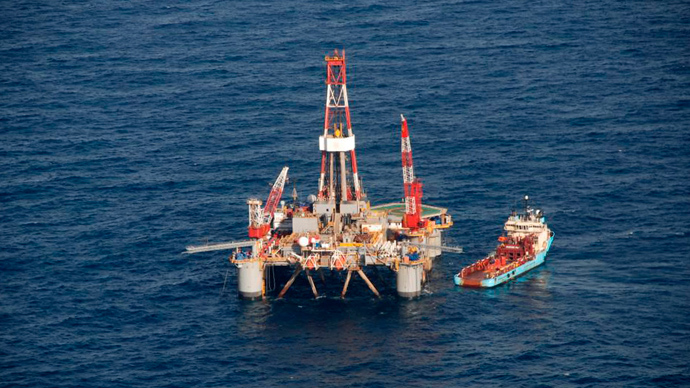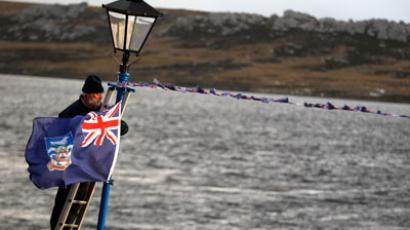Argentina cries foul on Falklands oil drilling, threatens 15-year sentences

The Argentinian government has fired its latest shot across the bows of the UK over the Falkland Islands, passing a law which could see British oil executives locked up for 15 years for drilling in the disputed archipelago.
The Argentine embassy in London issued a statement saying "the
law provides for prison sentences for the duration of up to 15
years; fines equivalent to the value of 1.5 million barrels of
oil; the banning of individuals and companies from operating in
Argentina; and the confiscation of equipment and any hydrocarbons
that would have been illegally extracted,"RT Spanish reports.
The Argentine congress earlier agreed to levy £100m fines against firms engaged in "illegal exploration and exploitation" off the Falklands, or Malvinas as they are known in Argentina, the daily reports.

The embassy further said the new law had been adopted by the country’s Congress to punish hydrocarbon exploration in the area of the Argentine continental shelf, which it claims are in contravention of a UN resolution.
"These attempts are manifestly contrary to Resolution 31/49 of the United Nations General Assembly, which requires the UK and Argentina to refrain from taking decisions that would imply introducing unilateral modifications into the situation of the Malvinas Islands while the sovereignty dispute between the two countries is still pending," the BBC reports the statement as reading.
The UK Foreign Office disputed the claim, saying the activities were entirely “legitimate and legal” and completely dictated by the government of the islands – which remains a British overseas territory.
A Foreign Office spokesman said: "The UK Government unequivocally supports the right of the Falkland Islanders to develop their natural resources for their own economic benefit.
"This right is an integral part of their right of self-determination, which is expressly contained in the International Covenant on Civil and Political Rights.
"Argentine domestic law does not apply to the Falkland Islands or South Georgia and the South Sandwich Islands, which are UK overseas territories."
Argentina has ratcheted up its territorial claims at the United Nations since the discovery of oil in the Falklands in 2010, using threats of legal action to dissuade British firms from drilling offshore the islands.
Most major oil firms have opted not to work in the area, fearing it could hurt their business interests on the Argentine mainland.
Falklands Oil and Gas, Premier Oil, Rockhopper Exploration and ,
however, have been undeterred in scouting for gas and oil in the
disputed South Atlantic area.
Premier Oil, for example, has a development plan for the firm’s Sea Lion field, with the first oil expected in 2017. The Sea Lion field is estimated to have between 300 and 350 million barrels of recoverable oil.

In July, the Argentine government threatened Premier Oil it would initiate administrative, civil and penal action against it with regard to these activities. Premier said the threat of Argentine action was a “risk worth taking”.
British media reports said the Argentine embassy had already sent more than 200 letters to companies directly or indirectly involved in regional oil exploration, warning them they are similarly liable to administrative, civil and criminal actions, Reuters reports.
The Falklands have been disputed by the two states for nearly 200 years, with Argentine forces invading the territory on 2 April 1982 in a failed bid to take them back.
A total of 650 Argentine soldiers and 255 British servicemen were killed in the ensuing two month war, which ultimately ended in Argentina’s surrender.
Islanders voted by 1,513 to three to remain a British overseas territory in a referendum in March, although Buenos Aires has rejected their right to self-determination.
Most Argentines, meanwhile, believe the islands are the rightful
property of the South American state and remain a symbol of
national unity.













